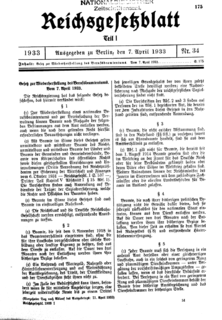 W
WAnti-Jewish legislation in pre-war Nazi Germany comprised several laws that segregated the Jews from German society and restricted Jewish people's political, legal and civil rights. Major legislative initiatives included a series of restrictive laws passed in 1933, the Nuremberg Laws of 1935, and a final wave of legislation preceding Germany's entry into World War II.
 W
WThe Enabling Act of 1933, formally titled Gesetz zur Behebung der Not von Volk und Reich, was a law that gave the German Cabinet—most importantly, the Chancellor—the power to enact laws without the involvement of the Reichstag or consult with the Weimar President Hindenburg, and to override fundamental aspects of the Weimar Constitution. The Enabling Act gave Hitler plenary powers and followed on the heels of the Reichstag Fire Decree, which had abolished most civil liberties and transferred state powers to the Reich government. The combined effect of the two laws was to transform Hitler's government into a legal dictatorship and laid the groundwork for his totalitarian regime.
 W
WThe Imperial law regarding the introduction of a war and civil ensign was an imperial law of the revolutionary German Empire of 1848. It describes the colours black-red-gold and the usage of a general German imperial flag and a war ensign for the Imperial Fleet.
 W
WThe Law for the Restoration of the Professional Civil Service, also known as Civil Service Law, Civil Service Restoration Act, and Law to Re-establish the Civil Service, was a law passed by the Nazi regime of Germany on 7 April 1933, two months after Adolf Hitler had attained power. It was one of the first anti-Semitic and racist laws to be passed in the Third Reich.
 W
WThe Nuremberg Laws were antisemitic and racist laws that were enacted in Nazi Germany on 15 September 1935, at a special meeting of the Reichstag convened during the annual Nuremberg Rally of the Nazi Party. The two laws were the Law for the Protection of German Blood and German Honour, which forbade marriages and extramarital intercourse between Jews and Germans and the employment of German females under 45 in Jewish households, and the Reich Citizenship Law, which declared that only those of German or related blood were eligible to be Reich citizens. The remainder were classed as state subjects without any citizenship rights. A supplementary decree outlining the definition of who was Jewish was passed on 14 November, and the Reich Citizenship Law officially came into force on that date. The laws were expanded on 26 November 1935 to include Romani and Black people. This supplementary decree defined Romanis as "enemies of the race-based state", the same category as Jews.
 W
WParagraph 175 was a provision of the German Criminal Code from 15 May 1871 to 10 March 1994. It made homosexual acts between males a crime, and in early revisions the provision also criminalized bestiality as well as forms of prostitution and underage sexual abuse. All in all, around 140,000 men were convicted under the law.
 W
WThe Reichstag Fire Decree is the common name of the Decree of the Reich President for the Protection of People and State issued by German President Paul von Hindenburg on the advice of Chancellor Adolf Hitler on 28 February 1933 in immediate response to the Reichstag fire. The decree nullified many of the key civil liberties of German citizens. With Nazis in powerful positions in the German government, the decree was used as the legal basis for the imprisonment of anyone considered to be opponents of the Nazis, and to suppress publications not considered "friendly" to the Nazi cause. The decree is considered by historians as one of the key steps in the establishment of a one-party Nazi state in Germany.
 W
WThe Reinheitsgebot is a series of regulations limiting the ingredients in beer in Germany and the states of the former Holy Roman Empire. The best known version of the law was adopted in Bavaria in 1516, but similar regulations predate the Bavarian order, and modern regulations also significantly differ from the 1516 Bavarian version.